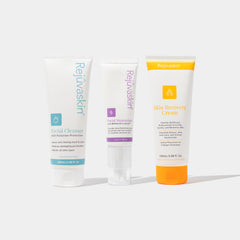As winter approaches, a common question arises: should you switch to a thicker moisturizer for the cold season? The answer isn't one-size-fits-all, and it largely depends on various factors, which we’ll take a look at. Today, we’re going to chat about the debate surrounding winter skin care, exploring whether the switch to a heavier cream-based moisturizer is necessary or not. So, let’s get started.
How Do I Know What The Best Moisturizer For Winter Is?
To address this question, it's crucial to understand your skin's needs and the role of moisturizers in skincare. Also keep in mind that your cleansing routine plays a big role in your skin barrier’s health. Here are a few more factors you should think about:
Your Skin Type
If you have naturally oily skin, using a heavy cream-based moisturizer may lead to clogged pores and breakouts. On the other hand, individuals with dry or combination skin may benefit from the added hydration a thicker moisturizer provides during winter's harsh conditions.
How Often You Moisturize
If you're diligent with your skincare routine and apply moisturizer regularly, your skin may not require an ultra-heavy moisturizer, even in winter.
Your Different Options
Humectants like hyaluronic acid attract moisture to the skin, while emollients like shea butter lock in that moisture. A well-balanced moisturizer with both humectants and emollients can work effectively year-round. If you have a well-balanced moisturizer, you won’t need extras during the winter.
Do I Need to Ditch My Lightweight Moisturizer For Something Else During the Winter?
Not necessarily, it depends on what you’re using. You don't have to bid farewell to your favorite lightweight moisturizer when the temperatures drop. Here's why:
You Can Layer Anyway
Layering skincare products is a popular technique that allows you to tailor your routine to your skin's changing needs. Begin with a hydrating serum or toner, followed by your lightweight moisturizer. This combination can easily provide necessary moisture without the heaviness.
A High-Quality, Lightweight Moisturizer Is Just Fine
If you’re using a quality product, and it’s working for you, there’s no reason to toss it out when winter comes around. For example, our ReVita-D Facial Moisturizer is packed with humectants and emollients to nourish your skin deeply, making it suitable for winter use. Plus, it contains vitamin D, which plays a crucial role in maintaining healthy skin.
So, What Type of Moisturizer Should I Use In Winter?
Put simply, keep using what works for you now. If you try to switch things up, you might end up with skin that revolts on you. For some, barrier creams can clog pores, and other creams could cause excess oil production. At the end of the day, your best bet is to stick with what works for you now and pay attention to your skin. Is it asking for more?
If you find that, given no change in your routine, your skin is drier than normal, consider adding rather than replacing something in your routine. For example, try adding a hydrating serum underneath your moisturizer. Don’t jump right into thick creams unless you need to – our skin is pretty good at adapting, after all!





















Leave a comment